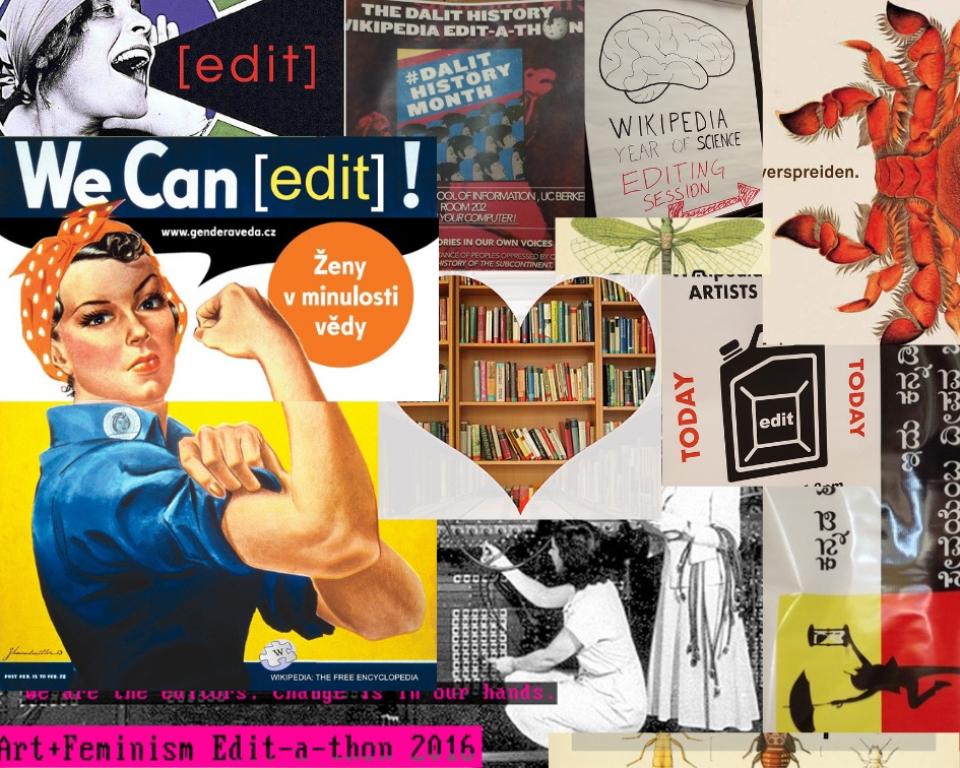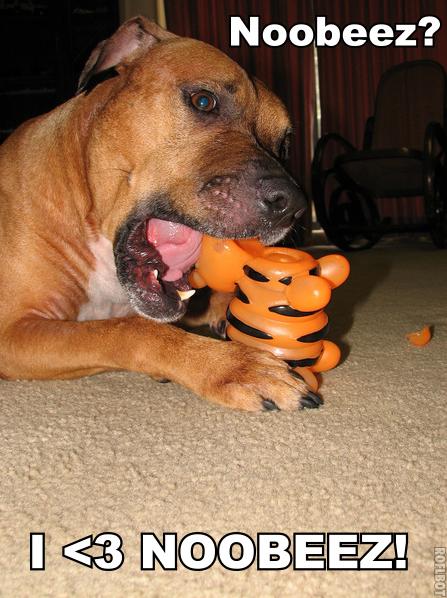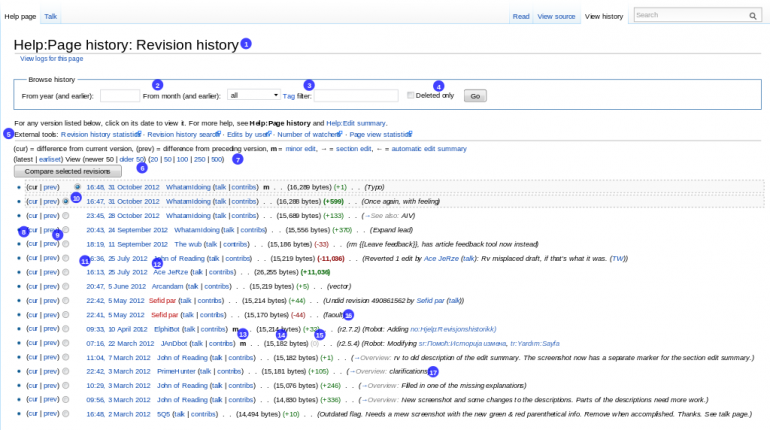
Collage of editathon posters. Source: Wikimedia commons.
For those with access to the internet, Wikipedia is the benchmark of common knowledge. The processes of knowledge production are inevitably fraught with imbalances of power: Who gets to write and gets written about? Who gets to speak and who among them is heard? What gets illuminated as authoritative and credible knowledge; what gets dismissed as unverifiable or insignificant? Who gets erased from collective human memory or is represented only through one-sided versions? Take, for example, a patent owned by Google titled “Providing knowledge panels with search results”. (Note the mention of “trusted encyclopedia” in its text.) Google’s Knowledge Graph determines what is shown prominently on the first page of its web search results. It is only one of the myriad factors at play in determining knowledge that is "known". Knowledge is power, so is information. The sum of all human knowledge on the internet as it stands today mirrors the fault lines of race, caste, class, gender and many other groupings of humankind.
The sum of all human knowledge on the internet as it stands today mirrors the fault lines of race, caste, class, gender and many other groupings of humankind.
Edit-a-thons have emerged as a popular outreach activity for bridging Wikipedia’s gender gap, that is, increasing the participation of women and gender-diverse individuals1 and growing the body of encyclopedic content about them. By definition, edit-a-thons are coordinated editing events, often based on a subject or theme, carried out virtually or in the same physical space. Edit-a-thons on topics related to gender attract much enthusiasm among those who deeply care about the subject, irrespective of whether they frequently contribute to Wikipedia or its sister projects. However, edit-a-thons conducted in a sub-optimal way negatively affect the experiences of contributors on Wikipedia and off it. As a Wikimedian actively volunteering for the past decade, I offer some suggestions to current and future edit-a-thon organisers who may not have enough experience of the nuts and bolts of Wikipedia, the internal dynamics of its communities and its systems of governance.
As of August 2018, active Wikipedias exist in 292 languages. Every Wikipedia is governed by five fundamental principles and its own policies. The latter is determined by volunteer communities after following processes that involve discussions and arriving at a consensus. Communities propose, introduce, amend and repeal policies. The context of this article is limited to the English-language Wikipedia for obvious reasons.
Working with novice editors
The “online encyclopedia anyone can edit” lowers the bar to entry in the process of knowledge production, and in some ways, the democratisation of knowledge. A serious contributor still needs to learn the ropes of contributing to an encyclopedia, participating in discussions, learning about policies and processes, and functioning as a part of the community. Most long-standing Wikipedians learn organically, by spending time getting their hands dirty on Wikipedia or its sister projects and using help from other Wikipedians. Novice contributors at edit-a-thons need to be made aware of the existence of the learning curve, which in my own experience, is enjoyable and rewarding.
A common complaint of edit-a-thon organisers is that articles created during the event end up marked for deletion despite meeting the notability criterion, or that edits are reverted for seemingly egregious reasons, and some participants are blocked from editing. This could be attributed to one or more reasons: An editor or admin who is biased or one who has blind spots that keep them from seeing the value of the edits. It could be someone from a privileged stratum of the society, flexing their muscles to invisiblise or whitewash certain topics from Wikipedia. Another plausible reason is that a sudden spike in editing activity originating from a range of IP addresses in the same span of time, on a set of related pages via newly-created accounts, may raise a red flag. This pattern of activity is similar to certain kinds of disruptive editing. It may draw the attention of those patrolling the space for vandalism, sockpuppetry, spam or even undeclared paid-editing. Novice contributors tend to make mistakes and unintentional violations of policies, which could be mistaken for malicious behaviour. There is no template solution to such a scenario, apart from trusting experienced Wikipedians to “not bite the newcomers”. If you plan to conduct an edit-a-thon that is likely to face these issues, please enlist one or more experienced Wikipedians to lead the event.
A common complaint of edit-a-thon organisers is that articles created during the event end up marked for deletion despite meeting the notability criterion, or that edits are reverted for seemingly egregious reasons, and some participants are issued a block from editing.

Image description: Banjo eating Noobeez. Wikimedia Commons/ Bastique, CC-BY-SA 2.0
As a spam-control measure, the number of new accounts that can be created from a single IP address within 24 hours is limited to six. At an event where everyone would use the same internet connection, ask participants to register an account before the day of the edit-a-thon. Either that or file a request for the limit to be lifted.
- Topics new editors may avoid
Topics that are the subject of acrimonious debate on Wikipedia or off it are not an ideal environment for a novice editor. The Training Library of the Wiki Education project recommends a list of topics to avoid. Also, it may be useful to check if a topic has been listed for “arbitration enforcement”, which places sanctions on articles and users editing highly contentious topics such as the “Arab/Palestinian-Israeli conflict” and “homoeopathy”: The current list of general sanctions notably includes the gender gap and “South Asian social groups explicitly including caste associations”.
The current list of general sanctions notably includes the gender gap and “South Asian social groups explicitly including caste associations”.
Biographies of living people are held to some of the strictest standards of editing, and justifiably so. A breach of privacy or serious misinformation could cause harm to the subject of the biographical article. On the other hand, individuals and organisations that work in the space of influencing public opinion have been known to edit the biographies of their friends or clients in ways that violate Wikipedia’s policies. Activity on biographies is, therefore, carefully scrutinised. It may not be the most pleasant environment for a newcomer.
- Thematic edit-a-thons
For thematic edit-a-thons that cover topics involving advocacy and activism, a crucial policy to consider is the one against “Righting great wrongs”. This policy is not dismissive of injustices. It merely states that Wikipedia is not the place to set them right, “We can record the righting of great wrongs, but we can't ride the crest of the wave because we can only report that which is verifiable from reliable and secondary sources, giving appropriate weight to the balance of informed opinion: even if you're sure something is true, it must be verifiable before you can add it.” This also ties with the policy of not publishing original thought or research on Wikipedia, because such material is not verifiable.
This policy is not dismissive of injustices. It merely states that Wikipedia is not the place to set them right
To paraphrase a policy addition made in January this year, “potentially controversial projects involving real-life identities of editors” and research activities that disrupt the community or negatively affect articles may “result in a loss of editing privileges”. Navigating such a policy can be tricky. If the topic of the edit-a-thon is likely to fall into this territory, please seek the help of experienced Wikipedians who are also familiar with the subject matter.
- Finding acceptable references
Wikipedia considers books, journals, reputed websites, magazines, and news outlets as reliable sources of information. However, such references can be hard to find. Scholarly labour of women gets routinely appropriated, women’s achievements are glossed over in popular discourse, news coverage extends to fewer noteworthy women, and there are fewer books written about or by women. This disparity reflects in the number and quality of references that can be accessed and cited on Wikipedia. In other words, the framing of what is considered knowledge on Wikipedia and what is not reflects the biases of the world.
Scholarly labour of women gets routinely appropriated, women’s achievements are glossed over in popular discourse, news coverage extends to fewer noteworthy women, and there are fewer books written about or by women.
The Wikimedia movement recognises the epistemological connotations of knowledge. It has been aiming to shift internal discourse about encompassing knowledge that exists in forms and formats other than those that Wikipedia and its sister projects already recognise as reliable.
- Privacy and safety of participants
As Shobha S V who organised a dozen gender gap-themed edit-a-thons in collaboration with the Centre for Internet and Society puts it, “Edit-a-thons serve as a show of solidarity” apart from raising awareness about gender diversity and attracting new contributors to Wikipedia. Edit-a-thons that run on sheer volunteer energy can be a remarkable exercise in which the encyclopedia is improved and enriched with text, photos, multimedia and references, often using little or no funds. Promotion of these events in the news media or social media can increase visibility and motivate participation. Here the event organiser needs to use caution, especially if the edit-a-thon is on a ‘conflict-prone’, sensitive topic or if the participants belong to vulnerable demographics:
-
Posting real names, Wikimedia usernames, photos and other personally-identifiable information of the participants on social media websites could end up revealing their real-life identities. This is also a violation of the policy against doxing. Everyone on Wikipedia is free to reveal as much (or as little) about themselves as they like; outing others against their will is unacceptable. The only way some people can bring their crumb to the table is by contributing pseudonymously; some others need to compartmentalise their online identities. Newcomers may not be aware of these concerns even if they consent to be photographed, videographed, or named.
The only way some people can bring their crumb to the table is by contributing pseudonymously
-
Edit-histories are publicly accessible and permanently logged. Posting the name of an article on social media websites along with another data point, such as the name of the person editing them, makes it easy to triangulate the person’s identity. So does posting public updates with such information while the event is underway.
-
The above two activities could potentially open the floodgates to harassment or abuse targeted at the participants on Wikipedia or off it, egregious deletion of articles, bad-faith blocking of accounts, and more. Of course, remedial measures exist, but as the title of my favourite essay on behavioural rules on Wikipedia goes, “Don’t be a jerk”.
-
It may be a good idea to frame a code of conduct or a “friendly space policy” (a relatively less officious-sounding term than the former) for the event.
It may be a good idea to frame a code of conduct or a “friendly space policy”
- In sum
Prospective organisers of gender-themed edit-a-thons may find these guidelines useful. Women in Red and Art+Feminism are two inspiring projects where one can study, among other things, the journey of an edit-a-thon.
Footnotes
1For the sake of brevity “women and gender-diverse individuals” has been attenuated to the term “women” in subsequent parts of the article. This is not an attempt to gloss over gender-diverse identity, merely one to ensure better readability.
- 6428 views







Add new comment